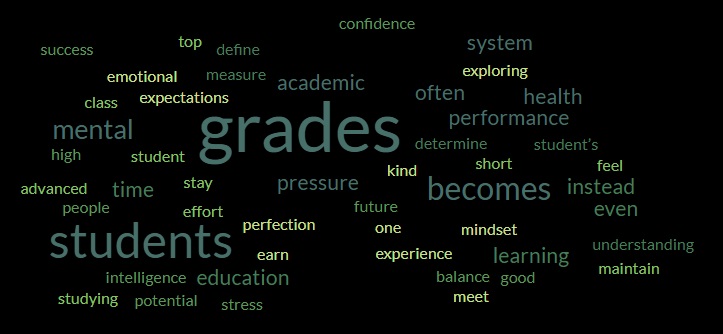Grades are often viewed as the most important factor in a student’s academic journey. They’re used to measure progress, reflect understanding, and, in many cases, determine future opportunities. In today’s society, high grades are seen as indicators of intelligence, discipline, and potential success. While this system may help teachers assess a student’s grasp of the material, it also comes with a serious downside: stress, anxiety, and declining mental health among students. We’ve reached a point where grades are doing more harm than good for many learners.
Despite what people assume, getting good grades is not always a sign of balance or confidence. A student might maintain an “A” in a class yet feel exhausted, anxious, and overwhelmed by the constant effort it takes to stay on top. Some students push themselves to the edge—studying for hours, sacrificing sleep, and still falling short of the results they hoped for. This ongoing cycle of pressure and performance can lead to burnout, discouragement, and even depression.
As a high-achieving student myself, a senior enrolled in advanced courses and ranked in the top three of my class, I can personally relate to this experience. To earn and maintain high grades, I often stay up late studying, skip rest, and stress over every assignment, quiz, and exam. It becomes a never-ending loop of pushing myself to meet expectations, only to be met with even more pressure. While the grades might look great on paper, the emotional and physical toll is invisible and often ignored.
This experience is not unique to me. In the article “Why Is School So Stressful? Exploring Causes and Solutions,” it’s noted that one of the most common effects students face is “persistent worry and fear about academic performance.” Yet, many adults and educators overlook this. There is a widespread assumption that students should simply perform well, without acknowledging the heavy burden they carry. The message we constantly hear is that grades are the key to success, the gateway to college, and the path to a secure future. With that kind of pressure, perfection becomes the expected standard especially for students in advanced or honors-level classes.
Over time, this mindset changes how we learn. Instead of exploring subjects with curiosity, we focus on doing just enough to earn an “A.” Learning becomes a chore, something we do to gain points rather than understanding. We memorize facts for a test and forget them soon after. Our education becomes centered around performance, not personal growth. The joy of learning is lost in the chase for perfect scores.

Even more troubling is how grades begin to shape our sense of self-worth. When a single letter becomes the measure of our intelligence or value, it creates a dangerous mindset. If we fall short of an “A,” we feel like failures—not just academically, but as people. This kind of thinking damages confidence and contributes to long-term mental health struggles. Students shouldn’t have to sacrifice their well-being to meet academic expectations.
It’s time we rethink the role of grades in education. They should not define who we are or determine our potential. Instead, the education system should promote balance supporting growth, encouraging curiosity, and protecting mental wellness. A student’s value lies not in their GPA, but in their effort, creativity, resilience, and ability to grow through challenges.
In conclusion, while grades may serve a purpose, they should not come at the cost of students’ mental and emotional health. We need to move away from a system that rewards perfection and instead build one that values real learning and well-being. Students are more than their grades and it’s time our schools recognized that.































